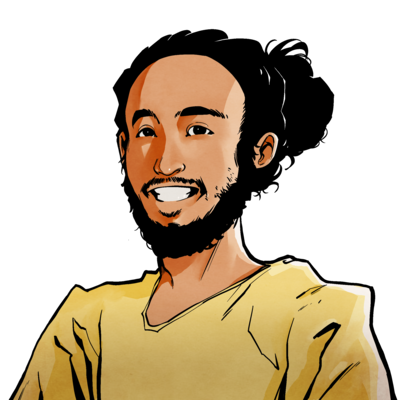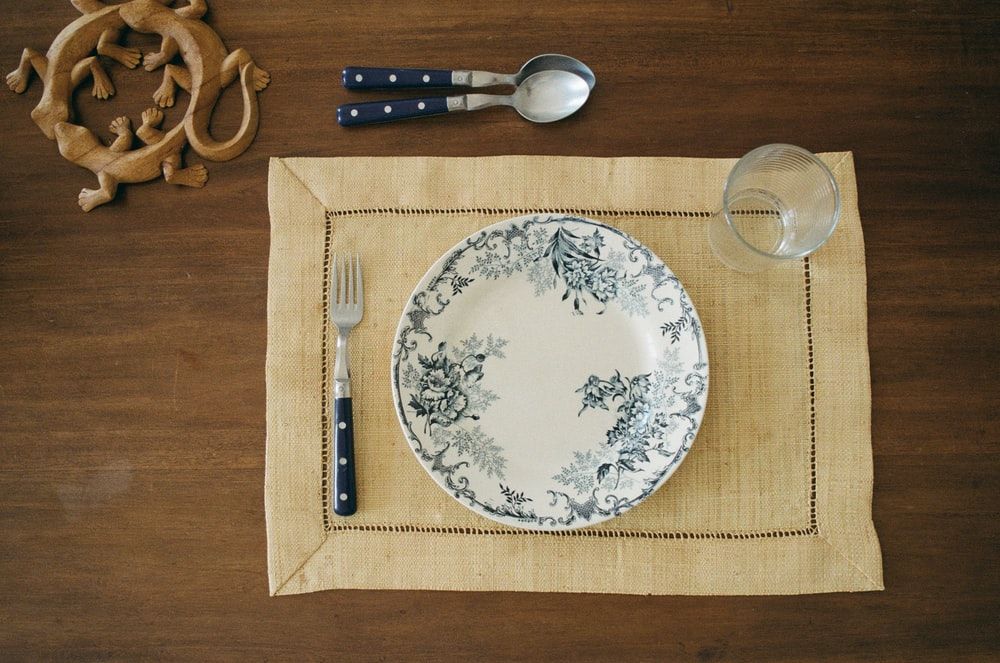
Hey everyone. Before we get into this, I am not a medical professional (sorry dad). Everything that I’ve written here is based on personal experience and publicly available information. If you’re considering doing an extended fast, do your own research. ✌🏽
A couple of months ago, my marathon-running-roommate Kenton convinced me, my other roommate Tyler, and my girlfriend Mack to attempt a 72 hour fast with him. I’d been curious about fasting for a while but wanted to start with 24 hours and eventually work my way up to a full three days. I thought about passing up the opportunity, but instead opted to send it. With just a few months worth of Intermittent Fasting under my belt, I threw myself into the inferno.
If you’re like me and just want a quick tl;dr checklist on how to fast, I’ve got one for you at the bottom of this piece! Click here.
What is Fasting?
Fasting is not consuming calories for a certain amount of time. There are a few common approaches that are now widely used & researched.
- Intermittent Fasting (IF) is a daily practice of time-restricted feeding in which you segment your day into (1) a fasting window when you don’t eat and (2) a feeding window when you eat normally. Common cadences for IF are 16:8 (16 hours fasting, 8 hours feeding), 20:4, and even 23:1 (one-meal-a-day).
- Extended Fasting is an episodic practice in which you restrict feeding for a longer time. Whereas IF is a daily practice, this is one that could be done every few months or so. The length and frequency are up to you, and you can learn more about the physiology at each stage of the fast here.
I intermittent fast with a 16:8 cadence most days, but this post will primarily cover my experience with an extended fast. You can weave in pieces of both approaches into your lifestyle because as I’ll show, they can both provide numerous benefits to lifespan, healthspan1, and wellbeing.
Why Fast?
Everybody has their own motivations for fasting. I’m personally interested in longevity and the health benefits, which have stood the tests of time and scientific scrutiny.
There are many new and exciting research findings coming out regarding the complex psychological & biophysical changes involved, but here are a few that I could understand as a layman.
- Fat Loss: Since you’re not consuming any calories, your body needs to use its resources to survive. Carbs & glucose are short-lived so we’re left with fat and muscle. It’s inefficient and counterproductive to guzzle down muscle mass, so your body instead consumes stores of fat, and old, dysfunctional cells. In men, the body even ramps up HGH production to prevent muscle loss.
- Ketosis & More Energy: As you enter a fasted state, your body begins to produce ketones by breaking down fat stores. These serve as a kind of backup battery of energy in addition to glucose. Many people anecdotally report higher energy levels, mental sharpness, and general wellbeing once they’ve adjusted to this state.
- Anti-Inflammatory: Inflammation (swelling) is part of your body’s natural healing process, but can be damaging when chronic. By decreasing the count of suspect cells in the blood (called monocytes), fasting has been shown to reduce inflammation2 in the body.
- Steady Blood Sugar: Since fasting pushes your body to prefer fat over carbs or glucose, insulin production decreases. Over time, your body becomes more sensitive to insulin, which can lead to more stable blood sugar and fewer crashes (e.g. the post-dessert slump).
- Neurodegenerative Disease Protection: By fighting metabolic syndrome, reducing excessive inflammation, and optimizing neuron health, fasting has been shown to reduce or prevent the onset of neurodegenerative diseases like Alzheimer’s and Dementia.
- Autophagy: When your body is fed, cellular growth & division proliferate. When it’s fasted however, the body begins an evolutionary process known as autophagy (literally meaning cellular self-eating). Your body removes old, dysfunctional, potentially cancerous3 cells, and recycles them for cell repair and cleaning.
- Longevity: Through some magical combination of these benefits, along with a lower risk of many diseases, (or some mechanism we don’t understand yet) fasting is one of the most promising frontiers towards living a longer and healthier life.
Clearly there are a lot of reasons to pay attention and give fasting a closer inspection. However, there are no silver bullets in nutrition.
If you want to lose weight, I wouldn’t recommend fasting as the only strategy to employ. Being unprepared or inconsistent with fasting could lead to cycles of fast and feast in an attempt to alleviate unaddressed body image problems. The psychological downsides of this are real, and you should take this into consideration when thinking about a fast. I would look into other methods of weight loss like caloric restriction (consuming slightly less than you burn) as well to see what would be best for your specific goals.
Fasting also isn’t right for everybody, especially if you’re diabetic, have chronic disease, are considered an elder or a child, or are within a few years of giving birth.4 Okay this is starting to sound like the end of a viagra commercial.
If you have any concerns, talk to a doctor to be sure. 🥼
📝 A note on voluntary suffering. One of my strongest convictions is that voluntary suffering makes us better, stronger, and more resilient. I’m not advocating masochism, but the body is inherently antifragile and grows from acute stressors — just think about weightlifting and vaccines. In my eyes, fasting is similar, and signals to your body that it’s time to step up.
The Objections
The week after the fast while feasting on Souvla, Kenton and I had a conversation with someone about fasting. We told her about the experience along with some bits and bobs of research that we had done beforehand, but realized just how many gaps there were in our understanding. She was clearly unconvinced and shrugged it off as another fad diet5, which left me skeptical myself.
I had a lot of random, unsubstantiated facts and anecdotal knowledge floating around, but I couldn’t clearly articulate why this could be a healthy lifestyle choice, or why I decided to do it. Of course, it’s not for everybody, but there must be some reason for its passionate adherents.
“Uhh…. it uhh.. helps you live longer, since glycogen is gone and then ketones are good for you plus like autophagy to eat your cells for cancer and stuff.”
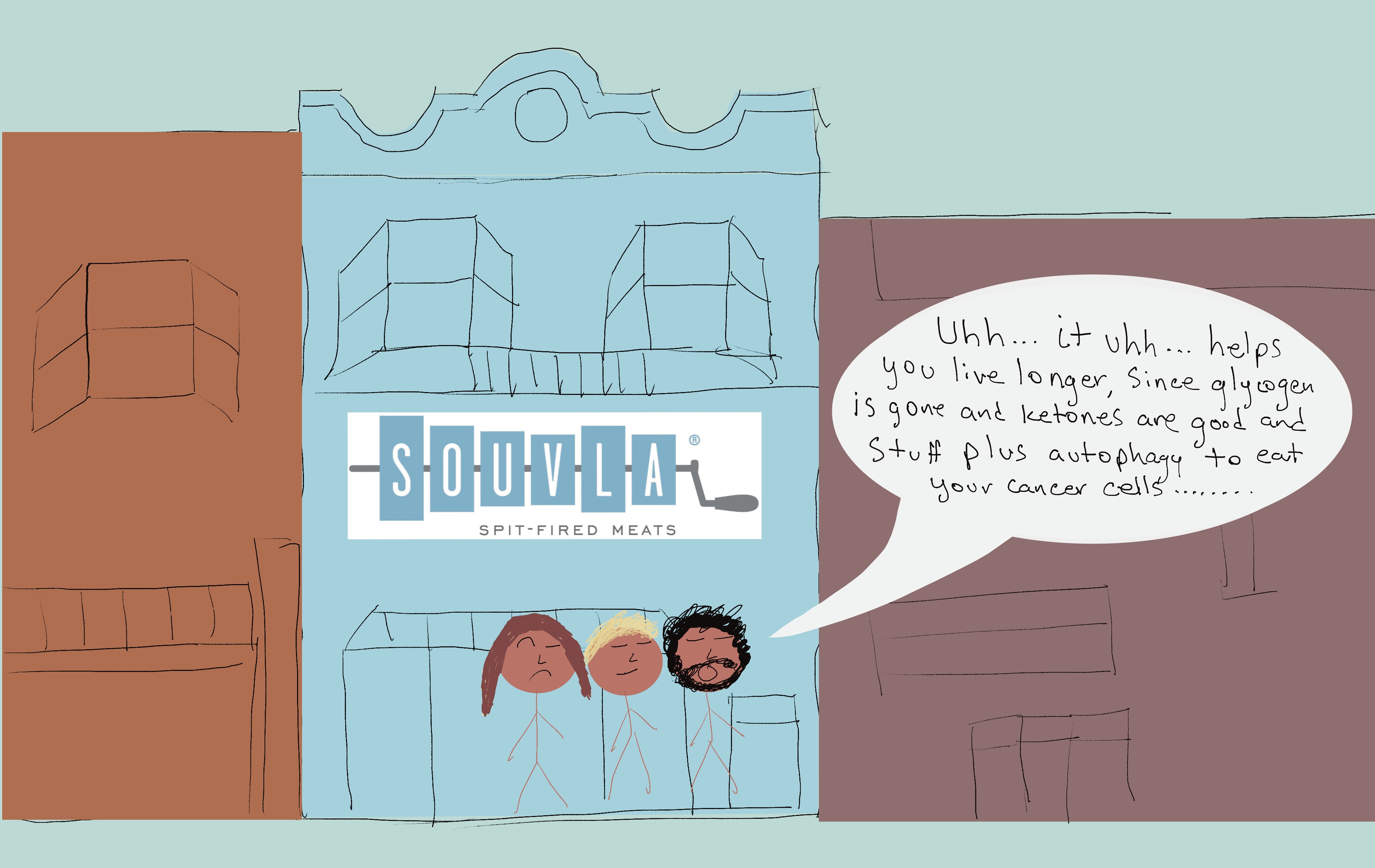
This is one of the reasons why I decided to write this piece — I wanted to explore the research, understand for myself how fasting works, and tie the science into my experience, deep in the trenches of hunger. This next section will go over some of the common objections that I’ve had or heard, and will attempt to shed some light on them.
Fasting is just a fad diet
There have been many recent nutritional trends captivating the public eye, such as the meat-only carnivore diet. Although fasting has seen a resurgence due to a confluence of cultural factors, it’s inaccurate to characterize it as a fad. Societies have been employing it for thousands of years. Various religions have used it as a physical and spiritual cleanse, and the research points to fasting as a lifestyle, not a passing fad.
It’s not normal to starve ourselves
It’s certainly not normal in our modern society. We have on-demand access to delicious food all day. Our problems result more from excess, rather than scarcity. What our bodies aren’t physiologically used to is a constant deluge of calories and digestive strain from non-stop eating. This IV drip of calories contributes to a whole host of metabolic, weight, and neurological issues.
From an evolutionary perspective, it’s abnormal for us to be eating three meals a day plus snack — Dr. Mark Mattson of Johns Hopkins University even asserts that there’s no scientific basis for this culturally ingrained cadence. Before agriculture, it wasn’t unusual to eat one or two meals a day and thus our bodies evolved the ability to tap into existing fat stores for energy. Society has advanced faster than our biology, and the truth is that fasting is closer to what our bodies are designed to do.
It strains our bodies
This is true. Fasting is pretty strenuous on the body, but that doesn’t mean it’s a bad thing. There’s a potent hormonal cocktail of cortisol and adrenaline that is secreted when in a fasted state. This contributes to the mental acuity that many experience but is also stressful on the body and can contribute to insomnia during extended fasts.
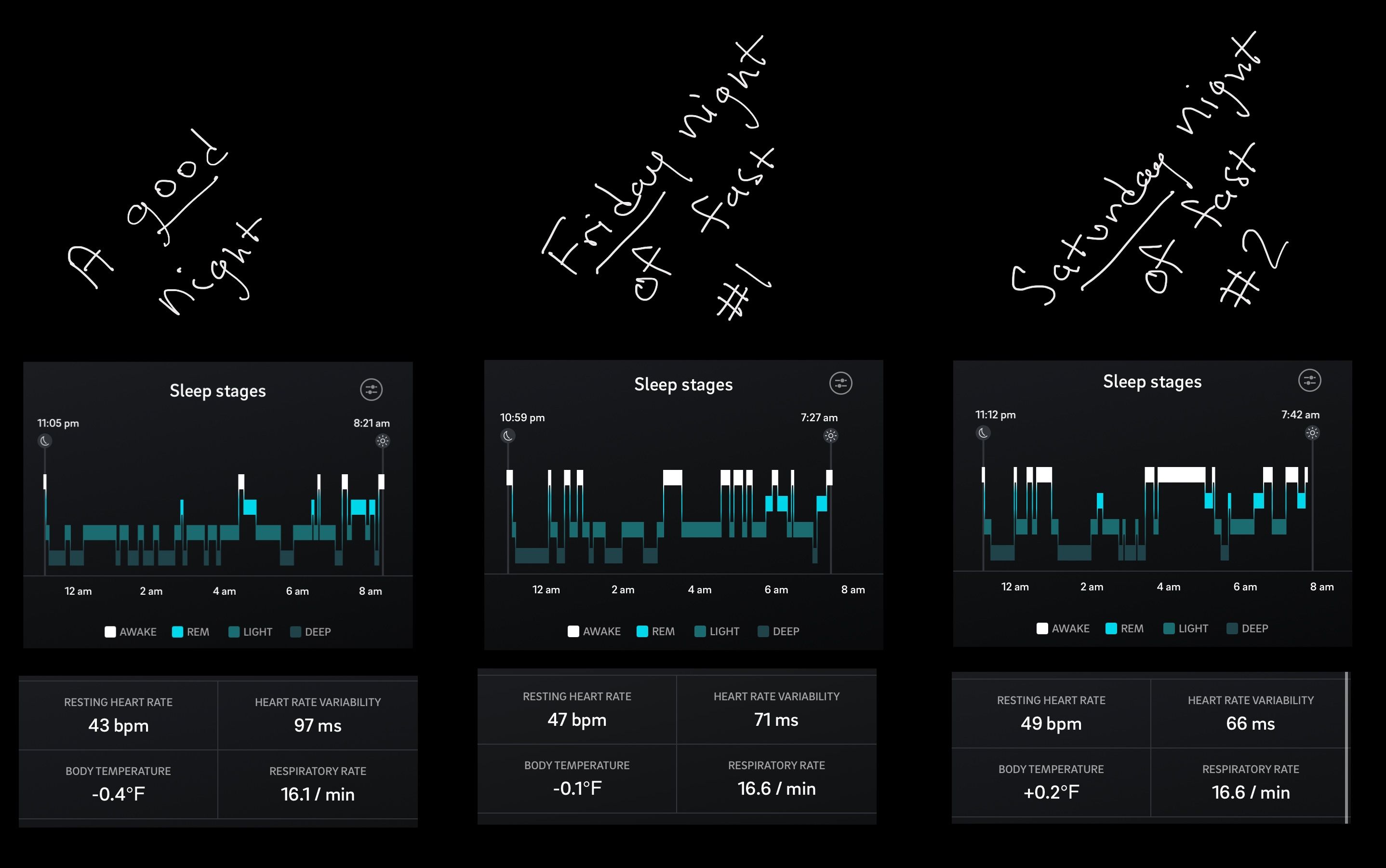
Those wide awake white blocks tho
A digression on biometrics: I track my sleep pretty extensively with the Oura Ring. By all measures, my sleep was negatively impacted by fasting. Compared to what I would consider a ‘good’ night of sleep, I had a higher resting heart rate, a lower heart rate variability, a higher respiratory rate, and higher body temperature.
High intensity interval training and weightlifting literally break down muscle fibers so they regrow stronger and denser than before. In a similar way, fasting trains your body to switch between glycogen and fat stores more efficiently, clean itself through autophagy, and better control its insulin response.
I’m going to lose my muscle
It just makes sense — if you don’t eat food, your body has to eat itself to survive… right? The reality is more nuanced than that. It turns out that muscle gain / loss is mostly a function of exercise. Sure, you need protein and calories to maintain muscle but your body has vast stores of both. Unless you have a low single-digit body fat %, you’ll likely be fine.
As I mentioned above, your body ramps up HGH production partially in order to preserve muscle mass. If you’re a primitive hunter that hasn’t eaten for days, it doesn’t make sense to start off munchin’ on the parts of your body that are most likely to contribute to a successful hunt.
Isn’t breakfast the most important meal of the day?
Not quite… The literal definition of breakfast (the meal you break your fast with) is arguably the most important meal of the day, but the conventional definition that involves sugary cereal and overpriced coffee is not.
The notion of breakfast as “the most important meal of the day” was created by General Foods marketers in 1944 and other cereal companies to, well, sell more cereal. Since then, there has been a lot of research debunking these unsubstantiated findings.
The reality is that it’s important to break your fast with nutritious, protein rich, and fibrous food6 — however you can probably ditch the 8am bowl of Lucky Charms.
The Experience
I have notes / rants on multiple mediums (Zero, Roam, my memories, Mack) that I’m going to synthesize and share with you.
Thursday
We ate our last meal for the weekend on Thursday evening (dramatically dubbed The Final Supper), after we were all finished working for the day. The feast was a hodge-podge mix of eggs, granola, and extra fancy nuts. Afterwards, we scrawled our before weights onto the living room whiteboard, downed a motley of electrolyte supplements (sodium, magnesium, zinc, calcium, and potassium) and drifted off into a deep slumber.

Friday
Friday morning was normal. I fast intermittently most days, so I knew the lay of the land up until 2pm. After that, I started to feel weird. I think my body was adjusting to becoming more fat-adapted. Here are some notes I took during this time.
2:02pm: Starting to feel a bit sluggish and distracted. My hunger is at about a 5/10, and it was honestly worse this morning.
4:12pm: It’s been about 20 hours and I’m a little on edge right now. The closest analog that I can compare this to is the come up of a psychedelic.
Around this time is also when Mack decided to break her fast after the 24 hour mark, following some nausea and unsettling articles regarding the potential reproductive harms of fasting for women. That evening she made some fried eggs with avocado… The smells and sounds of the kitchen were tantalizing and I felt a strong desire to scarf down everything in the pantry. I felt the most hunger about 24 hours into the fast.
Saturday
I woke up around 8am Saturday morning and felt terrible. Low energy, fantasies of food, lack of sleep7, and a general malaise. I had what was anecdotally known as the keto flu, a state that feels similar to a sickness (though not contagious) resulting from the transition into a fat burning state. The flu didn’t last forever though, and after some electrolytes and a coffee I felt better than ever.
We spent the afternoon doing chores, and then went to Golden Gate Park for a few hours, soaking in the sights and the sun. We walked by many small bakeries and restaurants and even saw a man (1) drop some bread rolls on a questionable San Francisco sidewalk (2) curse at the sky and then (3) put the bread back in his brown paper bag. Respect. My savage, hungry self would’ve done the same.
I realized that past a certain point, the primary challenge of fasting is mental. My body would relish in burning through my fat stores for days, though my mind would yearn for something to eat (especially when surrounding by the heavenly scent of bakeries). So much of society is built upon the primal acts of eating or drinking — it’s difficult to walk 5 minutes in a city without seeing a restaurant or store that sells food.
Mack and I discussed whether we would give up the need to eat if granted the option (we both said no), saw a roller skating derby in the park, packed into a tweakin’ MUNI bus, and picked up a few massive but on sale avocados & pumpkin on the way home. That evening I felt an incredible surge of mental energy and entered a deep state of focused flow. My body felt hazy, but my mind was as clear as ever.
Sunday
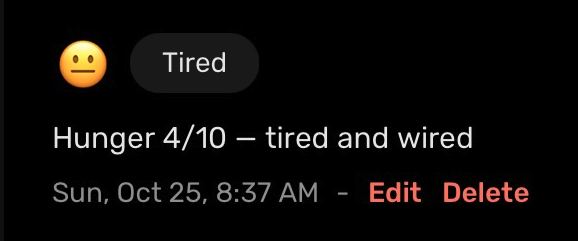
Gooooooood morning! It was the final day of the fast and I couldn’t believe I’d made it this long. I felt much better than the previous morning but was still dazed and sleep deprived. Tired and wired, indeed.
The entire day felt like a slow crescendo of hunger and excitement until The Break at 7pm that evening. The more I thought about it, the hungrier I would get. I had to turn my mind away from food, to not torture myself.
5pm rolled around and we headed to Grocery Outlet to get food for the week, and more importantly, a feast for the night. Reader, please do as I say, not as I do — because I did something not recommended after a 72 fast, which is to eat everything in sight.
I started off slow, priming my stomach with lemon water, and then savoring bone broth as though it was the nectar of the gods. I lost myself in the first few sips. As the scent of spiced broccoli and salmon from the oven wafted through the kitchen, I buzzed with excitement (or maybe it was my rising blood sugar). Once the final piece of broccoli was gone, it turned into all-out mayhem.
In total, here’s what I ate:
- Lemon water (half-cup)
- Bone broth (half-cup)
- Spicy tomato juice (half-cup)
- Salmon (1/3 pound)
- Broccoli (20)
- Eggs (2 over-easy)
- Avocado (half)
- Fancy nuts (a handful)
- Lemon meringue almonds (too many)
- Chocolate (a few pieces)
- Pumpkin spice protein bar (half)
- Coconut ice cream (…)
In aggregate, I ate more than 3000 calories in a matter of two hours. As I’ll mention more in the lessons section, this is not recommended. But you know what? I was proud of my accomplishment and decided to treat myself — who cares if I regretted it a few hours later?
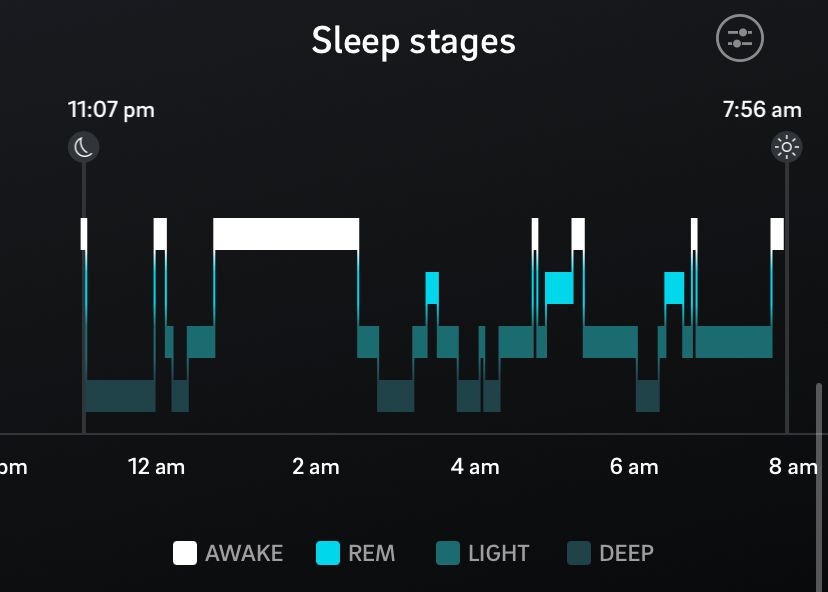
My sleep that night, inspired by post-feast digestive problems
And with that, my first ever extended fast was officially over. It was an incredible experience, but a literal roller coaster, as you can see below.
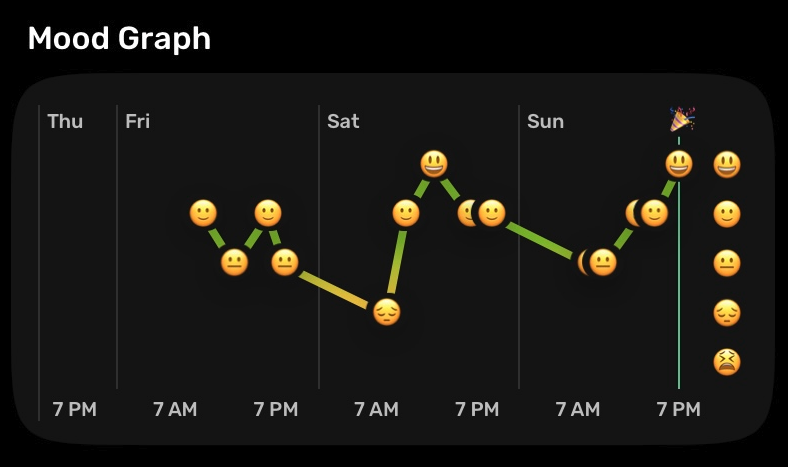
Zero has the cutest graphs
Lessons Learned
My general strategy (if you can even call it that) when trying something new is to throw myself into the fray. I schedule a time with an ‘accountability partner’, do a sprint of research, and just let the experience unfold. After this, I like to reflect and distill the major lessons on how to improve the process in the future. Here is a combination of things I would do differently (1) before the fast (2) during the fast and (3) after the fast.
Leading up to the fast I would ease my body into being fat-adapted. This is a combination of (1) sandwiching your fast with a few days of a keto diet before & after — which Dr. Peter Attia calls ‘The Nothing Burger’ and (2) restricting your feeding window for a week leading up to the fast. Both of these help train your body & mind to function without food and get you into a fat-adapted state… faster.
Related to above, once the fast is over, I would break the fast with a lighter hand. The Zero app recommends that you follow a layered approach, gradually working your way up to more complex food every few hours.
- First, start with liquids such as broths or juices without sugar (to not strain the digestive system).
- Gradually introduce foods that are low on the glycemic index like eggs, avocados, and soft-cooked vegetables.
- Transition slowly, with no more than 500 calories every 2-3 hours, while making sure to chew food thoroughly.
- Eat something with probiotics to ease digestion.
Opt for salt pills or bullion instead of salt water. The combination of Himalayan sea salt and lukewarm tap water is one of the most disgusting things I’ve ever tasted, even with flavor deprived taste buds. It’s also difficult to gauge exactly how much salt water you should drink, while pills of salt or blocks of bullion are easier to measure out.
One of the toughest parts of an extended fast is the lack of quality sleep. This is partially due to an increased adrenal & cortisol response that’s keeping you alert in case some juicy food wanders by. In the future, I would take additional supplements and employ strategies to help sleep.
- 100-600mg of Phosphatidylserine to calm the adrenal glands.
- 1mg of Melatonin to help transition the body into a state of sleep.
- Blue light avoidance 3-4 hours before bed.
- No caffeine after 2pm.
- Of course, the commonly recommended electrolytes like sodium, magnesium, potassium, and zinc at proper doses depending on your weight.
- Unfortunately there haven’t been any studies looking at optimal electrolyte intakes during fasting. I would recommend just following the guidelines on the nutrition labels.
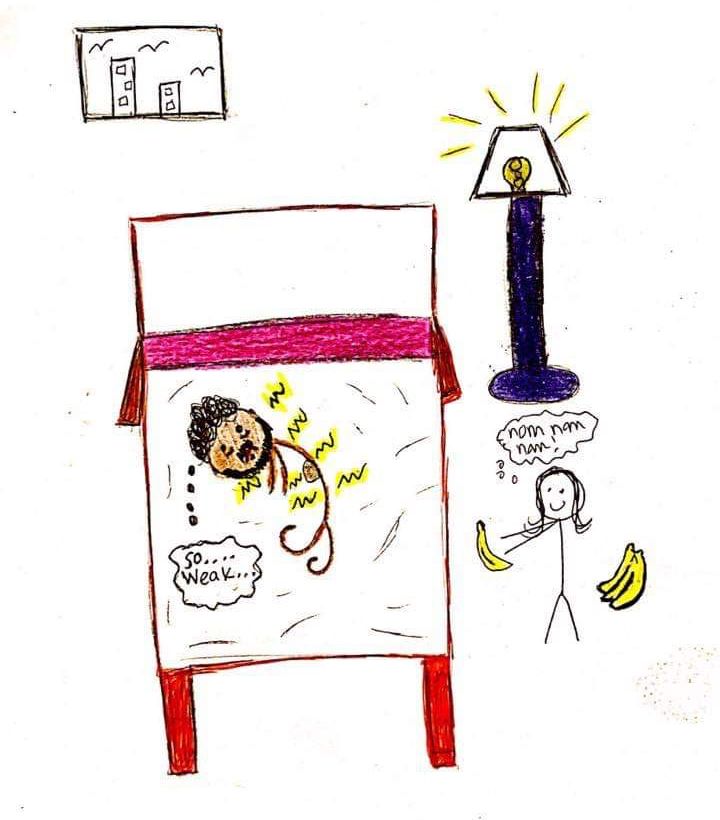
Thanks Mack…
Some low-hanging fruit is to not torture yourself. This means staying away from food or anything that could remind you of food (especially from 2pm - 6pm which is typically peak hunger). This is difficult if you’re around other people that aren’t fasting, but can be remedied by ample communication and staying away from delicious Italian bakeries.
I started (and subsequently broke) my fast in the evening. This is just one way of starting a fast. In the future, I would experiment with different start-times. For example, by starting in the morning, you could better time your break to ease back into a normal diet instead of stuffing your face at 8pm like I did. The downside is that the first few days will be more difficult, but it’s all about what works best for you.
One travel strategy is to fast on the plane. One benefit is the premeditated decision to say no to the rubbery McChicken & milkshake at the airport. The other major benefit is a reduction in jet lag — your circadian rhythm transitions better to a new time if you fast during the lag and begin eating according to the new time.
To minimize hunger, I would drink more coffee, green tea, and carbonated water. I had a half-cup of black coffee in the mornings but mostly stayed away due to caffeine sensitivity — however that’s what decaf is for. In addition, green tea has catechins which help liberate fatty acids from stores and into the bloodstream, while reducing hunger. Carbonated water can also reduce hunger and provide some textural diversity to fluid consumption.
Fasting Checklist
- Mandatory electrolytes: sodium, potassium, magnesium.
- Recommended electrolytes: zinc, calcium, phosphorous, chloride.
- Optional supplements for sleep: 100-600mg phosphatidylserine, 1mg melatonin before bed.
- Drink plenty of water (still & carbonated) as well as black coffee or green tea to stave off hunger & help release ketones.
- Spend the week before slowly restricting your feeding window and reducing carb intake.
- After the fast, eat 500 calories of easy-to-digest food every 2-3 hours — prepare this beforehand!
Conclusion
Halfway through the fast, a friend sent me this:

Brilliant. I think I have seen through reality a bit more. We live in a tiny band of understanding, with the whole gamut of human experience just beyond our comfort zone. The unquestionable axioms we’ve been told about nutrition like the food pyramid’s carb heavy diet as the source of truth, the necessity of small meals throughout the day for weight loss, and the demonization of all fats are just not true.
Fasting was one of the most difficult things that I’ve willingly put myself through. I’m in awe at the human body and its ability to withstand pressures like this. I’ve never been one to take things at face value and fasting isn’t any different. I’m excited and inspired by this experiment, and will be repeating this many times in the future. I hope to do a similar fast every 3-4 months and continue to iterate on the process.
Stay hungry fasted, my friends. 🥑
Thank you so much for reading! This is the longest thing I’ve ever written, but I felt the subject deserved it. Have you ever considered fasting before? Is there anything that you know about it that I haven’t mentioned in this piece? I would love to hear about it and connect on Twitter!
📝 A few months ago, @KentonPrescott, @tylerjrichards, @Mackenzie_Patel and I embarked upon an extended fast. I honestly couldn't find good resources with a combination of the science and a ‘trip report’, so here it is!https://t.co/eXII7SjPqF
— nikhil thota నిఖిల్ (@nikhilthota) December 28, 2020
If you are interested in fasting, do research beforehand to figure out if it’s something that could benefit you, and possibly talk to a doctor to make sure you’re not in a group that would be negatively affected. In addition, I recommend downloading the Zero app by Dr. Peter Attia. It’s free8, has a beautiful timer, and well-researched articles.
Shoutout to the roommates (& honorary roommate) Tyler, Kenton, and Mack for sharing this experience with me, and to Mack, Jess, Spencer, Kenton, and Tyler for looking at drafts of this!
One of the most common misconceptions in longevity is conflating lifespan and healthspan. Many people I’ve talked to don’t care to improve longevity because they don’t want to live longer as a decrepit geezer. What these people are referring to is lifespan, which is only one part of the longevity equation. Healthspan on the other hand, is more a function of how good and healthy you feel while you’re alive. A 100 year old with heart problems and dementia has a great lifespan with a poor healthspan, while an 80 year old that’s in great shape and runs marathons has slightly less lifespan, but much higher healthspan. Fasting has been shown to improve both lifespan and healthspan, helping you live a longer and healthier life. Dr. Attia describes the distinction here. ↩︎
This reduction in inflammation might be because the western world eats too much — there’s a good chance that fasting just gives our metabolic processes some much needed rest. Over 40% of Americans are obese, which leads to a whole host of metabolic issues. This is an unfortunate confluence of factors like the unhealthy Standard American Diet (SAD 😢), excessive convenience and comfort, and lack of consistent / accurate health information. ↩︎
Yes, fasting can even help the treatment of cancer. The exact mechanism is still unknown but autophagy seems to play a large role. In addition, there’s promising research indicating that autophagy inhibits viral replication of what have typically been lifelong neurological diseases like HSV (cold sores). I have no idea what’s happening in this image but I love it. ↩︎
Unfortunately, fasting can obstruct reproductive processes. Creating a child demands a lot of energy, so the body needs to know it has enough in reserve. Mack explains it eloquently in her piece. ↩︎
Here are a few gut-checks for my views presented in this piece, expressed in terms of probabilities. 95% chance that 16:8 IF daily extends lifespan & healthspan over no IF with daily Lucky Charms consumption. 5% chance that in 20 years, we’ll realize that fasting is a bad idea. 90% chance that I’ll be on this same (or more restrictive) fasting regimen in a year. 0% chance that I’m completely correct about everything in this piece 😅 ↩︎
Some of my favorite breakfast foods are eggs, avocado, oatmeal, nuts, fresh fruit, and falafel bowls. ↩︎
There is an evolutionary reason for this reduction in sleep. The primitive human in a fasted state needed to be alert at all times. It was a life or death situation that would determine the tribe’s next meal. ↩︎
Zero also has a premium version with get a 7-day free trial during your first extended fast. Definitely try it out, but I find the free version to be enough for my needs. ↩︎
